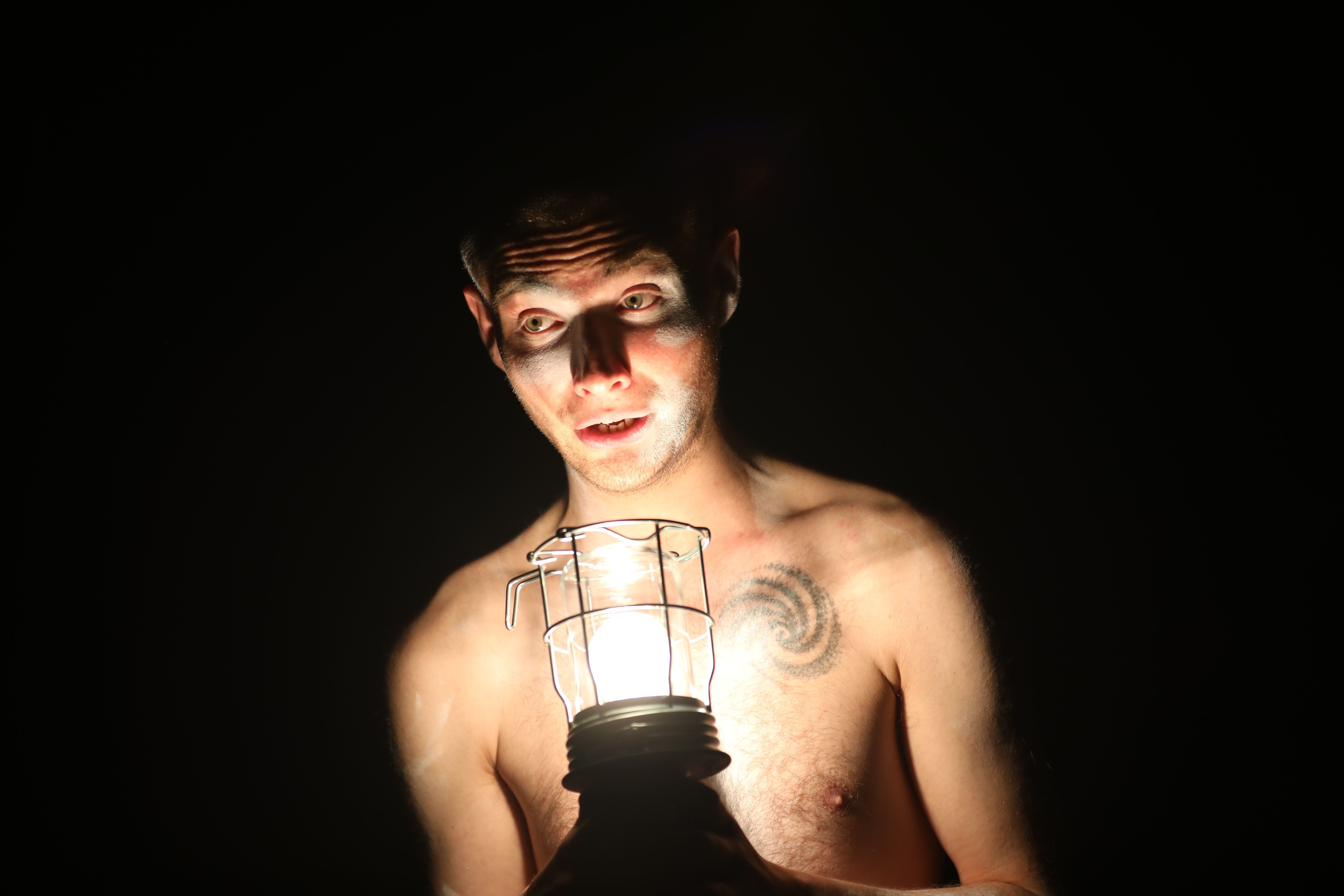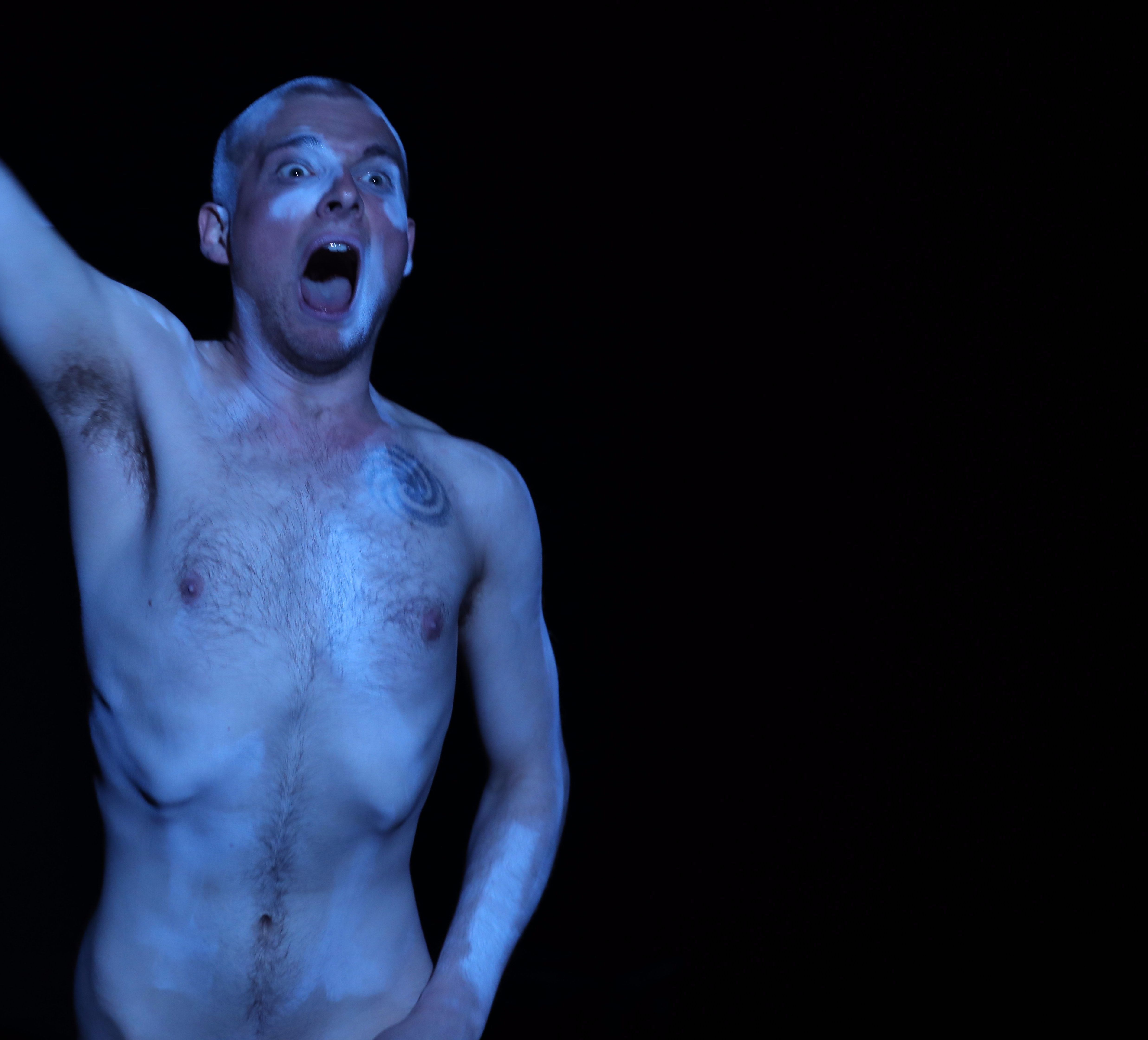JAMES WITHERSPOON reviews This Is Not Culturally Significant at The Bunker.
In the toilets of Southwark’s Bunker theatre, graffiti proudly proclaims ‘Mummy, I thought we were going to see the Lion King’. Next door, in a former underground air raid shelter, Adam Scott-Rowley spends 45 minutes alone and naked ranting to his audience, adopting personas, and pretending to perform various sexual acts on himself and furniture. Indeed, in the bold, emotional, and awe-inspiring monologue, Scott-Rowley’s open bareness is integral to the experience; he allows himself to become a vehicle for controversy, and an expression of humanity in its truest form.
The nudity that defines This is Not Culturally Significant is an immediate catalyst for shock. The show opens with the actor simulating female masturbation on himself as he yells in pleasure. Subsequently, it is discovered that this is part of a webcam act, but in the moment it is brash and confrontational, calculated to grab audience attention. Scott-Rowley obviously knows more than most that controversy proves to be a tantalising draw for audiences. What is it about the naked human body that elicits such a strong reaction, a mix of repulsion and curiosity? For certain we usually find ourselves clothed, but the source of embarrassment over nudity remains a product of societal conditioning. From an early age, nudity is ingrained in us as taboo, and this stigma accompanies us throughout our lives. Scott-Rowley’s open disregard for this norm draws attention to our conditioned state and makes us realise just how silly and petty our attitudes are in the first place. Of course, by the end of the show, the audience has grown accustomed to this aspect of the performance – have we been brainwashed into an acceptance of this new behavioural lingo? I suspect it’s actually the reverse, a return to pre-Fall Edenic innocence, as it were. In this way, the nudity is able to both create an aura of mystique and controversy over the show, and also to emphasise and explore the arbitrary taboos that plague modern society.

Throughout This is Not Culturally Significant, Scott-Rowley plays over ten characters, both male and female. His acting ability is more than sufficient to cover such a range of personas, but what costume would fit all the dimensions of his characters? Certainly, although he has male genitalia, the naked human body is more malleable than even unisex clothing (which perhaps usually has more of a male slant in any case). The nakedness becomes an exploration of the human body, not just the male body, and the actor himself becomes a blank canvas onto which character is painted with facial expression, physicality, movement and intonation. In this way, when he switches between sex worker, clubber, abusive husband, and spiritualist lecturer (amongst others), the transitions feel perfectly natural and unforced. Humanity is indeed humanity, and bare flesh is the most fundamentally human medium for conveying it – it seems that the optimal way for the audience to connect with each of the creative’s characters in such a short time is his nakedness.
The nakedness of the performance in this way helps to emphasise the bare humanity of the characters. All the characters in This is Not Culturally Significant are damaged in some way: whether rejected by society, their lovers, or suffering from hardship, Scott-Rowley surely wishes for the audience to sympathise with his characters and empathise with their stories. As the actor himself opens up in his physical nakedness, he is more able to covey the naked emotions of his characters. These are hurt people, at the end of their tethers and on the brink of self-destruction. The openness and honesty displayed in the acting extends to the feelings that underlie the monologue itself. Nudity symbolically lays everything bare in the first place so there is no need for more explicit exposition. The trust needed for one to expose themself in such a way inspires the audience’s own confidence in the actor from the get-go.

It’s worth a mention here that the sound and lighting design of the show is incredible. The actor’s body is illuminated in vibrant shades of blue, green and pink, fading into a Club Silencio-esque scene where only the face of the performer is lit and eventually dissolving into a brutal strobe-lit scene which is as disorientating as it is dazzling. This is accompanied by a three-dimensional soundscape that allows the audience a vivid spacial awareness: one is acutely aware if they’re in, under, or outside a nightclub by the dulling and blurring of sounds, diegetic noise, and Scott-Rowley’s own expressive attitude.
In conclusion, This is Not Culturally Significant is a remarkable work. It is brilliantly acted, fantastically visualised, and thought provoking, a large part of which comes from Adam Scott-Rowley’s nude performance. By using his own body as a canvas, he is able to confront the audience’s fears of nakedness, more effectively convey a plethora of characters and emphasise bare humanity in the most literal way. Indeed, almost as implied by the title’s own denial, one could say that this show is very culturally significant after all.
This Is Not Culturally Significant is running at The Bunker until June 3rd. Find tickets and more information here.
Featured image courtesy of Bessell McNamee.





